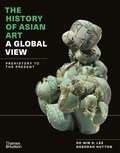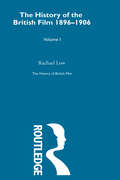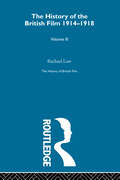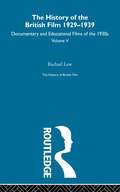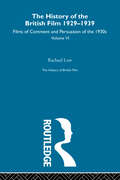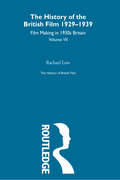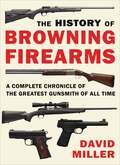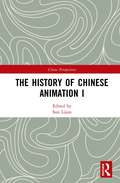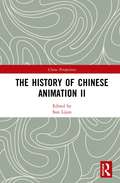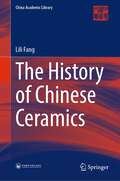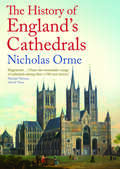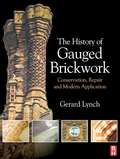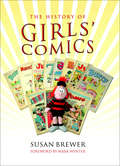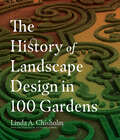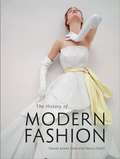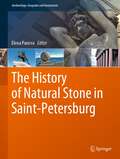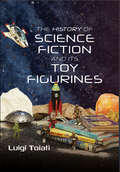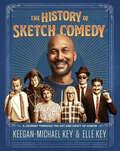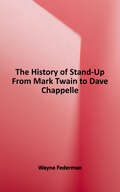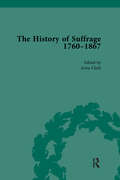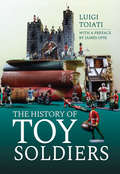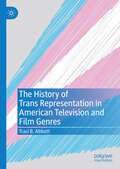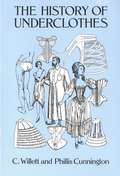- Table View
- List View
The History of Asian Art (First Edition)
by Deborah Hutton De-nin LeeA flexible, chronological history of art across Asia Organized chronologically, The History of Asian Art: A Global View covers the diverse art produced across all of Asia, including East Asia, South Asia, and Southeast Asia, in one volume. With a strong visual focus, two expert authors encourage readers to develop and apply art historical skills to Asian art. Twelve “Seeing Connections” help students make cross-cultural connections both within Asia and with cultures outside Asia.
The History of British Film (Volume 1): The History of the British Film 1896 - 1906
by Jeffrey Richards Roger Manvell Rachael LowThis set is one of the cornerstones of film scholarship, and one of the most important works on twentieth century British culture. Published between 1948 and 1985, the volumes document all aspects of film making in Britain from its origins in 1896 to 1939.Rachael Low pioneered the interpretation of films in their context, arguing that to understand films it was necessary to establish their context. Her seven volumes are an object lesson in meticulous research, lucid analysis and accessible style, and have become the benchmark in film history.
The History of British Film (Volume 3): The History of the British Film 1914 - 1918
by Rachael LowThis set is one of the cornerstones of film scholarship, and one of the most important works on twentieth century British culture. Published between 1948 and 1985, the volumes document all aspects of film making in Britain from its origins in 1896 to 1939.Rachael Low pioneered the interpretation of films in their context, arguing that to understand films it was necessary to establish their context. Her seven volumes are an object lesson in meticulous research, lucid analysis and accessible style, and have become the benchmark in film history.
The History of British Film (Volume 5): The History of the British Film 1929 - 1939: Documentary and Educational Films of the 1930's
by Low RachaelThis set is one of the cornerstones of film scholarship, and one of the most important works on twentieth century British culture. Published between 1948 and 1985, the volumes document all aspects of film making in Britain from its origins in 1896 to 1939.Rachael Low pioneered the interpretation of films in their context, arguing that to understand films it was necessary to establish their context. Her seven volumes are an object lesson in meticulous research, lucid analysis and accessible style, and have become the benchmark in film history.
The History of British Film (Volume 6): The History of the British Film 1929 - 1939: Films of Comment and Persuasion of the 1930's
by Rachael LowThis set is one of the cornerstones of film scholarship, and one of the most important works on twentieth century British culture. Published between 1948 and 1985, the volumes document all aspects of film making in Britain from its origins in 1896 to 1939.Rachael Low pioneered the interpretation of films in their context, arguing that to understand films it was necessary to establish their context. Her seven volumes are an object lesson in meticulous research, lucid analysis and accessible style, and have become the benchmark in film history.
The History of British Film (Volume 7): Film Making in 1930's Britain
by Rachael LowThis set is one of the cornerstones of film scholarship, and one of the most important works on twentieth century British culture. Published between 1948 and 1985, the volumes document all aspects of film making in Britain from its origins in 1896 to 1939.Rachael Low pioneered the interpretation of films in their context, arguing that to understand films it was necessary to establish their context. Her seven volumes are an object lesson in meticulous research, lucid analysis and accessible style, and have become the benchmark in film history.
The History of Browning Firearms: A Complete Chronicle of the Greatest Gunsmith of All Time
by David MillerA captivating and wonderfully illustrated chronicle of one of the most influential and legendary names in gunsmithing history. John M. Browning was born in Ogden, Utah, in 1855, into a world of gunsmithing. His father was a gunsmith who was already well known for a number of innovations in the field. As a young boy, John spent hours in his father's shop and allegedly knew the name of every part of a gun before he could read. It's hardly surprising that at age twenty-three, he was filing his first patent for the "J. M. Browning Single-Shot Rifle." Browning inherited his father&’s gun making shop, and with funds of less than a thousand dollars, developed it into a highly successful business that developed several iconic firearms including the Colt Peacemaker. Browning also cooperated with Winchester to develop a whole range of small arms including semi-automatic pistols, single-shot rifles, repeater rifles, and machine guns. His enthusiasm and creativity have led many to believe he is the greatest firearm designer of all time. This fascinating book describes the Browning history, and in addition to covering the full range of inventions and designs, also shows various gun-making artifacts, copies of designers' drawings, and interesting photographs of the weapons in the hands of users. The History of Browning Firearms makes a perfect addition to the libraries of Wild West buffs and firearms enthusiasts.
The History of Chinese Animation I (China Perspectives)
by Sun LijunChina has been one of the first countries to develop its own aesthetic for dynamic images and to create animation films with distinctive characteristics. In recent years, however, and subject to the influence of Western and Japanese animation, the Chinese animation industry has experienced several new stages of development, prompting the question as to where animation in China is heading in the future. This book describes the history, present and future of China’s animation industry. The author divides the business’s 95-year history into six periods and analyses each of these from an historical, aesthetic, and artistic perspective. In addition, the book focuses on representative works; themes; directions; artistic styles; techniques; industrial development; government support policies; business models; the nurturing of education and talent; broadcasting systems and animation. Scholars and students who are interested in the history of Chinese animation will benefit from this book and it will appeal additionally to readers interested in Chinese film studies.
The History of Chinese Animation II (China Perspectives)
by Sun LijunChina has been one of the first countries to develop its own aesthetic for dynamic images and to create animation films with distinctive characteristics. In recent years, however, and subject to the influence of Western and Japanese animation, the Chinese animation industry has experienced several new stages of development, prompting the question as to where animation in China is heading in the future. This book describes the history, present and future of China’s animation industry. The author divides the business’s 95-year history into six periods and analyses each of these from an historical, aesthetic, and artistic perspective. In addition, the book focuses on representative works, themes, directions, artistic styles, techniques, industrial development, government support policies, business models, the nurturing of education and talent, broadcasting systems, and animation. Scholars and students who are interested in the history of Chinese animation will benefit from this book and it will appeal additionally to readers interested in Chinese film studies.
The History of Chinese Ceramics (China Academic Library)
by Lili FangAdopting the perspective of anthropology of art and combining it with global academic insights, this book helps the readers to recognize that “history is, in great measure, the record of human activity which spreads from the local to the regional, from the regional to the global, and from the global to the universal.” Readers will learn that China was not only the first country to create porcelain, but also the first to export it to the world, both the products and its techniques. Therefore, the history of Chinese ceramics reflects the history of Chinese foreign trade on the one hand and depicts the expansion of Chinese ceramic techniques and cultures on the other. In addition to ceramics types, molds, decoration, and techniques, the book analyzes the spiritual impacts and aesthetic conceptions embodied in the utensils of daily use by the Chinese literati. Therefore, it reaches the conclusion that ideological systems and not technological systems are what bring about social revolutions. In addition, the book is richly illustrated with pictures of earthenware and finely glazed pieces from later periods.
The History of England's Cathedrals
by Nicholas OrmeThe first history of all the English cathedrals, from Birmingham and Bury St Edmunds to Worcester and York Minster England&’s sixty-two Anglican and Catholic cathedrals are some of our most iconic buildings, attracting millions of worshippers and visitors every year. Yet although much has been written about their architecture, there is no complete history of their life and activities. This is the first such book to provide one, stretching from Roman times to the present day. The History of England&’s Cathedrals explains where and why they were founded, who staffed them, and how their structures evolved. It describes their worship and how this changed over the centuries, their schools and libraries, and their links with the outside world. The history of these astonishing buildings is the history of England. Reading this book will bring you face to face with the Anglo-Saxons, Vikings, Normans, Reformation, Civil War, Victorian England, World War Two, and finally modern democracy.
The History of Gauged Brickwork (Routledge Series In Conservation And Museology Ser.)
by Gerard LynchThis book takes a look at the history and use of cut, rubbed and gauged brickwork; the use of tools and equipment and the differences between historic and contemporary bricks with a view to inform conservation and restoration decisions.The book uses case studies from England, Ireland and the US to illustrate the use of different materials and techniques on buildings ranging in age. Written by Dr. Gerard Lynch, the leading authority in this subject area, this book will be of particular interest to architectural historians, architects working on historic buildings and building conservators.
The History of Girls' Comics
by Susan BrewerSusan Brewer taps into the nostalgic women s market for comics from their childhood Jackie, Girl's Own, Bunty etc, from the early days in Victorian England to teen mags and TV-related comics, including Teletubbies and CBeebies. The book also covers partworks such as the highly collectable Vicky and other collectables, including annuals, covermounts and giveaways and toys and games tie-ins, including board games.
The History of Landscape Design in 100 Gardens
by Linda A. ChisholmThe History of Landscape Design in 100 Gardens explores the defining moments in garden design. Through profiles of 100 of the most influential gardens, Linda Chisholm explores how social, political, and economic influences shaped garden design principles. The book is organized chronologically and by theme, starting with the medieval garden Alhambra and ending with the modern naturalism of the Lurie Garden. Sumptuously illustrated, The History of Landscape Design in 100 Gardens is a comprehensive resource for garden designers and landscape architects, design students, and garden history enthusiasts.
The History of Modern Fashion
by Daniel JamesThis exciting book explores fashion not simply from an aesthetic point of view but also as a manifestation of social and cultural change. Focusing on fashion from 1850, noted fashion historians Daniel James Cole and Nancy Deihl consider the evolution of womenswear, menswear, and childrenswear, decade by decade. The book looks at the dissemination of style and the mechanisms of change, at the relationship between fashion and the visual, applied, and performing arts, the intertwined relationship between fashion and popular culture, the impact of new materials and technology, and the growing globalization of style. With photographs of costume from museums and images from the fashion press including editorial photography, illustrations, and advertising, the book will include insights into icons of fashion and the clothes worn by “real people†, providing a valuable visual reference for the reader.
The History of Modern Fashion
by Nancy Deihl Daniel James ColeThis exciting book explores fashion not simply from an aesthetic point of view but also as a manifestation of social and cultural change. Focusing on fashion from 1850, noted fashion historians Daniel James Cole and Nancy Deihl consider the evolution of womenswear, menswear, and childrenswear, decade by decade. The book looks at the dissemination of style and the mechanisms of change, at the relationship between fashion and the visual, applied, and performing arts, the intertwined relationship between fashion and popular culture, the impact of new materials and technology, and the growing globalization of style. With photographs of costume from museums and images from the fashion press including editorial photography, illustrations, and advertising, the book will include insights into icons of fashion and the clothes worn by “real people”, providing a valuable visual reference for the reader.
The History of Natural Stone in Saint-Petersburg (Geoheritage, Geoparks and Geotourism)
by Elena PanovaThe book introduces readers to the heritage of St. Petersburg, sharing the geological history of a unique city, a world heritage site, and part of the UNESCO list. It also explains the role of small towns and fortresses near St. Petersburg, whose stone decoration played an essential role in the city’s evolution and was key in the history of neighboring cultures. The book also describes the main architectural symbols of St. Petersburg, such as the Alexander Column, the Bronze Horseman, the Peter and Paul Fortress and more. In addition to five guided tours of the city center, it offers descriptions of historic quarries, some of which are now open-air museums.
The History of Science Fiction and Its Toy Figurines
by Luigi Toiati"This eye-opening book deserves a spot on the bookshelves of anyone who not only enjoys collecting, but also has a great interest in all facets of the history of our hobby." — Toy Soldier Collector Science fiction, as the name suggests, is the combination of science and fantasy. In addition to a literary form, it also encompasses film, TV, comics, toys and our beloved toy astronauts, or other figures such as aliens, monsters and other playable genres. The term science fiction was coined by publisher Hugo Gernsbach around the first decades of the last century to refer to the predominantly 'space' adventures covered in his magazines. Space invaded radio, cinema, TV, and consequently for a long time toy figurines were predominantly space-related, later evolving into other themes. This lavishly illustrated book covers both the history of literary science fiction, following in the footsteps of contemporary official criticism, and toy figurines inspired by science fiction. You will also find several other themes, such as the link between science fiction figures and cinema, radio, TV, comics, and more. Luigi Toiati offers to both guide the reader on an often-nostalgic walk through science fiction in all its various forms, and to describe the figurines and brands associated with it.
The History of Sketch Comedy: A Journey through the Art and Craft of Humor
by Keegan-Michael Key Elle Key"A boisterous debut … the authors are as funny as one would expect … this is a hoot.” ―Publishers Weekly “Will entice fans of Key & Peele … a fun and funny primer on the art form.” ―BooklistAuthors Keegan-Michael Key and Elle Key build on the popularity of their 2022 Webby Award–winning podcast and delve deeper into the world of sketch, helped along with new essays created expressly for the book by comedy greats.The History of Sketch Comedy will appeal to all kinds of comedy fans as well as fans of Keegan-Michael Key, whether they know him from his Emmy and Peabody-winning work on Key & Peele; his roles in Fargo, The Prom, Schmigadoon!, The Bubble, and the upcoming Wonka; voiceover work in The Lion King; or as President Barack Obama's anger translator, Luther.With epic personal tangents and hilarious asides, the Keys take you on an illuminating journey through all facets of comedy from the stock characters of commedia del arte in the 16th century, to the rise of vaudeville and burlesque, the golden age of television comedy, the influence of the most well-known comedy schools, and the ascension of comedy films and TV specials—all the way through to a look at the future of sketch on social media platforms. Along the way, we hear tales of Keegan's childhood, his comedy influences, and the vicissitudes of his career path. As the New York Times said in its review of their podcast, "this comedy nerd history is filtered through memoir, with Key relating stories of his budding fandom, training and rise from improv comic to television sketch artist."Part memoir, part masterclass, and hilariously embellished with priceless commentary, The History of Sketch Comedy highlights the essential building blocks of sketch comedy while interweaving Keegan's personal career journey and the influence of his comedy heroes. The text is complemented by original art by Elle Key and exclusive essays compiled from conversations with influential performers, sketch writers, and uber comedy fans including Mel Brooks, Julia Louis-Dreyfus, Mike Myers, Chris Rock, John Oliver, Tracy Morgan, Carol Burnett, Jim Carrey, Jordan Peele, and many more. This book is as entertaining as it is enlightening—a must-read for fans of comedy and all who aspire to comic greatness.EXPANDING THE HIT PODCAST: With content from the #1 trending, NAACP-award-nominated and Webby-Award-winning Audible podcast, and featuring new-for-the-book material as well as never-before-heard stories and essays, this book will be a hit for newcomers and avid listeners of the podcast alike.MASTER OF THE MEDIUM: Keegan-Michael Key is a bona fide maestro of comedy, with the chops, experience, and love for the history of the medium that make him the perfect expert on all things sketch. As co-writer Elle Key likes to say, "If Keegan-Michael Key was a guest lecturer at NYU teaching a course called 'The History of Sketch Comedy,' it would be a very popular class."EXCLUSIVE ESSAYS: Keegan and Elle interviewed over a dozen comedy legends exclusively for this book, and got their takes on topics ranging from the influence of Saturday Night Live, to women in comedy, to the mathematics of sketch. Hear, in their own words, from Mel Brooks, Mike Myers, Jordan Peele, Julia-Louis Dreyfus, John Oliver, Tracy Morgan, Stephen Colbert, Carol Burnett, Chris Rock, Bob Odenkirk, Mike Birbiglia, Matt Lucas, Ken Jeong, Christopher Guest, Gary Oldman, Kevin Nealon, Laraine Newman, and Jim Carrey.GIFTABLE VOLUME OF COMEDY GOLD: Original illustrations and personal photographs throughout make this unique comedy book as visually entertaining as it is enlightening. The perfect gift for comedy fans of a
The History of Snowman
by Bob EcksteinWho made the first snowman? Who first came up with the idea of placing snowballs on top of each other, and who decided they would use a carrot for a nose? Most puzzling of all: How can this mystery ever be solved, with all the evidence long since melted?The snowman appears everywhere on practically everything -- from knickknacks to greeting cards to seasonal sweaters we plan to return. Whenever we see big snowballs our first impulse is to deck them out with a top hat. Humorist and writer Bob Eckstein h...
The History of Stand-Up: From Mark Twain to Dave Chappelle
by Wayne FedermanToday's top stand-up comedians sell out arenas, generate millions of dollars, tour the world, and help shape our social discourse. So, how did this all happen? The History of Stand-Up chronicles the evolution of this American art form - from its earliest pre-vaudeville practitioners like Artemus Ward and Mark Twain to present-day comedians of HBO and Netflix. Drawing on his acclaimed History of Stand-up podcast and popular university lectures, veteran comedian and adjunct USC professor Wayne Federman guides us on this fascinating journey. The story has a connective tissue - humans standing on stage, alone, trying to get laughs. That experience connects all stand-ups through time, whether it's at the Palace, the Copacabana, the Apollo, Mister Kelly's, the Hungry I, Grossinger's, the Comedy Cellar, the Improv, the Comedy Store, Madison Square Garden, UCB, or at an open mic in a backyard.
The History of Suffrage, 1760-1867 Vol 6
by Sarah Richardson Anna ClarkThis work brings together key texts drawn from the history of suffrage advocacy and agitation. The whole issue of voting rights and representation is shown to be anchored firmly in the wider political culture of Britain and Ireland as well as the Empire as a whole. Volume 6 covers texts from 1860 to 1873.
The History of Toy Soldiers
by Luigi Toiati&“Amazing . . . A must-have must-read bible for lovers of toy history and in particular toy soldiers. Absolutely glorious!&” —Books Monthly Humans have made and collected toy soldiers from time immemorial. They amuse and comfort us, awaken our curiosity, turn aggressiveness into creativity. In The History of Toy Soldiers, Luigi Toiati, himself an avid collector and manufacturer of toy soldiers, conveys and shares the pleasure of collecting and playing with them. Far from a dry encyclopedia, it leads the reader through the fascinating evolution of the toy soldier from ancient times to the early twenty-first century. The author, as a sociologist with an interest in semiotics (the study of signs), offers truly original insights into why different types of toy soldiers were born in a given period and country, or why in a given size and material. The author&’s writing is packed with factual detail about the different types of toy (and model) soldiers and their manufacturers, but also with anecdotes, nostalgia, wit and his enduring passion for the subject. Six hundred beautiful color photographs, many depicting the author&’s own collection, complete this delightful book. &“Toiati creatively delivers exhaustive details, captivating anecdotes and a sense of nostalgia that exudes the fundamental childhood joy of playing with toy soldiers combined with adult collectors&’ wonderment at their charms.&” —Toy Soldier & Model Figure &“A book that will enter the annals of Toy Soldier collections as one of the best and most complete books on this topic.&” —IPMS/USA &“A great journey of exploration.&” —Miniature Wargaming
The History of Trans Representation in American Television and Film Genres
by Traci B. AbbottDue to the increase in transgender characters in scripted television and film in the 2010s, trans visibility has been presented as a relatively new phenomenon that has positively shifted the cis society’s acceptance of the trans community. This book counters this claim to assert that such representations actually present limited and harmful characterizations, as they have for decades. To do so, this book analyzes transgender narratives in scripted visual media from the 1960s to 2010s across a variety of genres, including independent and mainstream films and television dramatic series and sitcoms, judging not the veracity of such representations per se but dissecting their transphobia as a constant despite relevant shifts that have improved their veracity and variety. Already ingrained with their own ideological expectations, genres shift the framing of the trans character, particularly the relevance of their gender difference for cisgender characters and society. The popularity of trans characters within certain genres also provides a historical lineage that is examined against the progression of transgender rights activism and corresponding transphobic falsehoods, concluding that this popular medium continues to offer a limited and narrow conception of gender, the variability of the transgender experience, and the range of transgender identities.
The History of Underclothes
by C. Willett Cunnington PhiIlis Cunnington". . . thoroughness and most impressive scholarship . . . much entertaining detail and . . . pleasant humour." — The Times Literary Supplement (London)Underwear — practical garments with a utilitarian function or body coverings that serve an erotic purpose? As this fascinating and intelligently written study shows, the role played by underclothing over the last several centuries has been a varied one.In a well-documented, profusely illustrated volume combining impressive scholarship with an entertaining, often humorous style, two distinguished clothing historians consider undergarments worn by the English over the past 600 years. Beginning with the Middle Ages, the authors cover centuries of clothing history, including the Tudor period, the Restoration, the Victorian and Edwardian eras, and the twentieth century up to the eve of World War II. Drawing on extensive, research, the Cunningtons illuminate the role and function of underwear: it protected the wearer against the elements, supported costume shapes, served as an erotic stimulus, symbolized class distinctions, and fulfilled other social, sanitary, and economic functions. Enhancing the detailed, comprehensive text are more than 100 period illustrations and photographs depicting a laced-up bodice of the twelfth century, embroidered linen drawers of the sixteenth century, a hooped petticoat support in bentwood (c. 1750), footed long drawers (1795), nineteenth-century bustles, early nineteenth-century corsets for men, "Frillies for the Tiny Lady" (1939), and much more. A bibliography, appendix, and index complete a valuable reference work that will appeal to costume historians, sociologists, and other readers.
